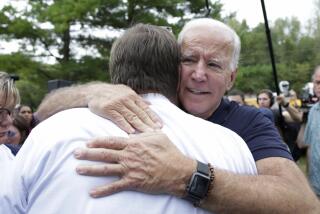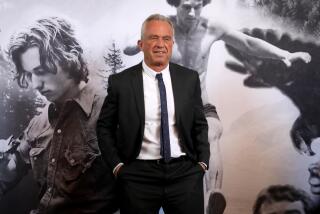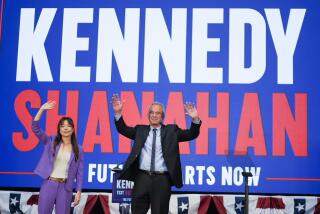Perot Backers Proud of Effort, Look to Future
The supporters of independent presidential candidate Ross Perot may be the happiest bunch of losers in American political history.
Far from despairing over their man’s third-place finish, the morning after the election found them proud that they had shocked the system and energized the electorate. They contend--and not without reason--that any cause that garners 19 million votes is not a losing cause.
“We feel terrific about what happened yesterday,” said Clay Mulford, the campaign’s general counsel and Perot’s son-in-law. “We went into this a little more than 30 days ago, and at that point Mr. Perot was at 7% in the polls. To do as well as we did last night we felt was really remarkable.”
Not only did Perot make a better showing than any other independent or third-party presidential candidate in modern history, but also he succeeded in drawing some new voters to the polls and in proving to the professional politicians that American voters are keenly interested in deficit reduction and government reform.
In fact, Perot’s personally financed presidential bid had such far-reaching impact that there is little doubt that he will continue to exert considerable influence on the nation’s political leaders--one way or another.
“You just know he’s not going to fade away,” said Larry Sabato, political scientist at the University of Virginia. “In fact, his biggest worry in the future may be overexposure. If it can happen to Michael Jackson and Madonna--two others whose popularity depends on television--it can to Ross Perot.”
In addition, some political scientists believe that Perot’s success might encourage other well-heeled people to run for the presidency and foster new efforts to establish a broad-based third party in the United States.
By winning 19% of the popular vote, Perot defied the predictions of many experts who expected his support to drop off immediately before the election--much as support dwindled for John B. Anderson in 1980 and George C. Wallace in 1968. Unlike Perot, neither Anderson nor Wallace had money to spend on last-minute advertising.
But Perot’s presence in the race apparently did not alter the outcome. Without Perot, according to a Times’ survey of voters, his supporters would have split about evenly for the other two candidates, giving Democrat Bill Clinton a 49%-44% victory over President Bush.
Perot’s supporters claimed some credit for the large voter turnout Tuesday. “We think we created the excitement in the race,” Mulford said. “We think we brought people into the political process who had never been in the political process before.”
Although Perot clearly stimulated voter interest in the election, there is no evidence that he alone was responsible for the high turnout. Among those who voted Tuesday who did not participate in the 1988 election, only 27% cast ballots for Perot.
One lingering question that haunted many Perot supporters Wednesday was what might have happened if he had not quit the race in July and re-entered in October. One Perot confidant said that, if the independent had stayed in, “he’d have gotten 35% and today you’d be calling congressmen to see how they’ll vote” when the election is decided in the House of Representatives in January.
In the future, Perot’s supporters are determined to play a continuing role in American politics. “Are we going to keep this thing going?” asked Orson Swindle, executive director of United We Stand, America. “In all candor, there’s no way we can stop it.”
There is little doubt that Perot will continue to appear on television talk shows, pressing for government reform. “He’s become kind of television-dependent,” said Lewis A Gould, political historian at the University of Texas. “I don’t think, psychologically, he’ll want to fade away.”
John Jay Hooker, a Nashville businessman who speaks frequently with Perot, said the Dallas billionaire has “earned the right to kibitz” with the White House and Congress.
Over the the next several weeks, Swindle said, he will meet with leaders of Perot’s nationwide volunteer organization to discuss the future. He indicated that the group is not ready to establish a third political party but that it would try to create a self-sustaining citizens’ lobby to try to hold the President and Congress accountable to the people.
On Wednesday, however, Perot received a letter from Theodore J. Lowi, professor of government at Cornell University, asking him to join with former third-party candidate Anderson, independent Connecticut Gov. Lowell P. Weicker Jr. and others in forming a broad-based third party. In his home state, Weicker heads a third party known as The Connecticut Party.
Lowi said United We Stand has a better chance of succeeding as a third party than any previous one because it represents people in the center of the political spectrum, not people on the political fringe. If Perot does not establish a third party, Lowi argued, “he’ll be a footnote--an asterisk in history.”
But those who know Perot best doubt whether he would be willing to become involved in a long-term, sustained political effort. They note that Perot failed to nurture United We Stand throughout most of the election season, causing some state-level leaders to quit in disgust.
“Ross Perot is not a strategic long-term thinker when it comes to his actions,” his son, Ross Perot Jr., acknowledged in an interview. “That’s what’s made him so successful and it’s also caused him some problems . . . .
“He likes to wrestle alligators and this is the biggest one he’s wrestled so far. The next time he sees one, he’ll probably jump in there and wrestle again. But I’m not sure that politics is the next arena he’ll jump into.”
Over the next few years, the popularity of Perot’s call for “shared sacrifice” is expected to help President-elect Bill Clinton in his efforts to reduce the federal deficit. But, if Clinton fails to respond to Perot’s agenda, most political analysts foresee a renewed presidential bid either by Perot or someone else.
“If the two parties don’t broaden their base,” Sabato predicted, “this is going to become a semi-permanent part of American politics.”
Hooker, whose prognostications about the unpredictable tycoon generally have been right, predicted flatly that Perot would be a candidate for President in 1996. “How does he get out of it?” he asked. “What’s he got better to do?” Perot’s son declined to predict whether his father would be a candidate again in 1996, although he said it might take several election cycles before his message of fiscal austerity and political rejuvenation sinks in. “You can’t go from ground zero to winning the presidency in a single cycle,” he said.
But without Perot’s leadership, his son questioned whether United We Stand would last for long. “What do you do with an organization like this for four years?” he asked.
One of those who hopes Perot remains active and runs again is Michelle Warren, 30, of Dallas, who came to the election-night rally that Perot threw for his supporters. Warren, who came with her husband and baby, said she had never been involved in politics before this year but would continue to work for Perot or his movement if it stays alive.
“I think a lot of people my age are fed up with the way things are going,” she said. “There’s not a lot of hope for the future, and he gave us hope.”
More to Read
Get the L.A. Times Politics newsletter
Deeply reported insights into legislation, politics and policy from Sacramento, Washington and beyond. In your inbox three times per week.
You may occasionally receive promotional content from the Los Angeles Times.






